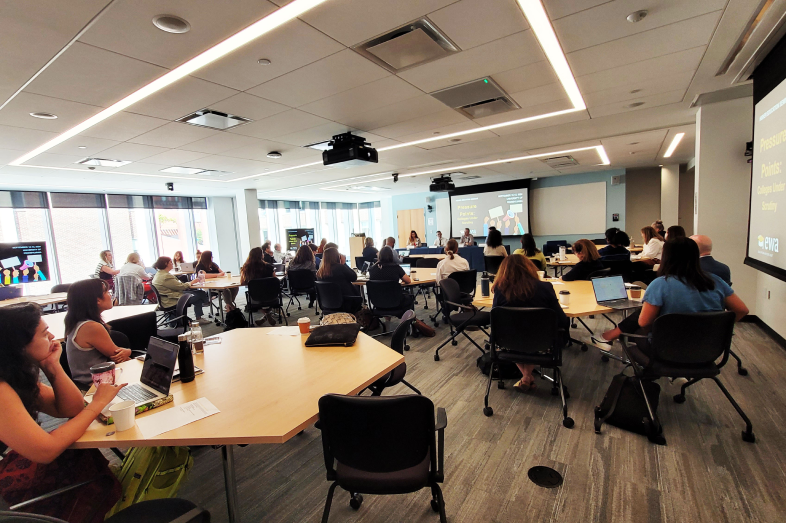
Tips for Partnering With Student Journalists
A student reporter and journalism professionals share tips on how to better collaborate, especially during campus protests.
Photo credit: Judy O’Babatunde

A student reporter and journalism professionals share tips on how to better collaborate, especially during campus protests.
Photo credit: Judy O’Babatunde
Higher education journalists and student journalists on campuses across the country find themselves seeking the same voices for stories about the youth vote, the importance of politics for young people and other things that are important to them.
They need the voices of students on college campuses to tell these stories, and at the Education Writers Association’s 2024 Higher Education Seminar at the University of Pennsylvania in September, both parties left with tips and a better understanding of how to do that.
“Students are in a unique position where they are the audience, and they are the writer, and you need to use that to your advantage as a student journalist,” said Sam Gregg, a film major at Drexel University. He is also the managing editor for The Triangle, the school’s independent student newspaper.
Gregg, along with other panelists, dispelled myths of student apathy on politics and voting. They also gave individual tips to journalist attendees on how to get needed voices for coverage and the shift in mindset that needs to happen to ingratiate themselves onto campuses. After all, higher education reporters should look to spend time on campuses getting to know people and issues.
Panelists spoke about story themes for the upcoming election that might be worth covering, such as the fact that millions of new students are going to be voting for the first time in their lives and see it as an opportunity to participate in something that older people think they can’t conceptualize. They also spoke about efforts to keep these new voters from voting, such as not allowing students to use college IDs and do mail-in voting. All agreed that students are interested in politics and should be included in the coverage.
Panelists acknowledged that most writers cover campuses from an administrative perspective when talking about issues, such as college closures, protests, budgets and finance, but that getting more student voices and perspectives could be valuable.
Wright shared a personal story of being a reporter in Virginia covering a unique voter registration drive for student athletes at the College of William & Mary. He found out about the story later than he would have liked.
“Had I known a student on campus who knew about that drive, it would have been easier,” Wright cautioned journalists, making a plea to help them see the benefit of working with student journalists. Wright reminded journalists that campus writers have a pulse on the issues on a campus and know who to speak to. They can get right to the source and the people in the know.
Janfaza added a tip that she uses: She sends emails or social media correspondence to all student organizations, which universities publish in handbooks regularly. Janfaza shared that her interest in covering politics from a youth perspective was borne during her time as a student during the Trump administration when she noticed that her peers had strong opinions about issues.
“I think it’s important to get student voices in those pieces because they are going to be the ones who are going to feel the impact of that on a day to day,” she said.
Gregg admitted that student journalists don’t have the experience that professionals do, but he said that he urges his writers to use their experiences to their advantage and stop trying to sound like they are writing for The New York Times. It takes acclimating students to the process of writing news stories instead of opinion pieces, which has helped journalism on campus, he explained.
Panelists agreed that student voices should be sought not only in telling stories but helping to construct them. Organizations would do themselves a favor by letting student journalists work on stories, they urged. They also said that working with student journalists would be great for mentoring and helping the next generation of journalists get their feet in the door.
Your post will be on the website shortly.
We will get back to you shortly